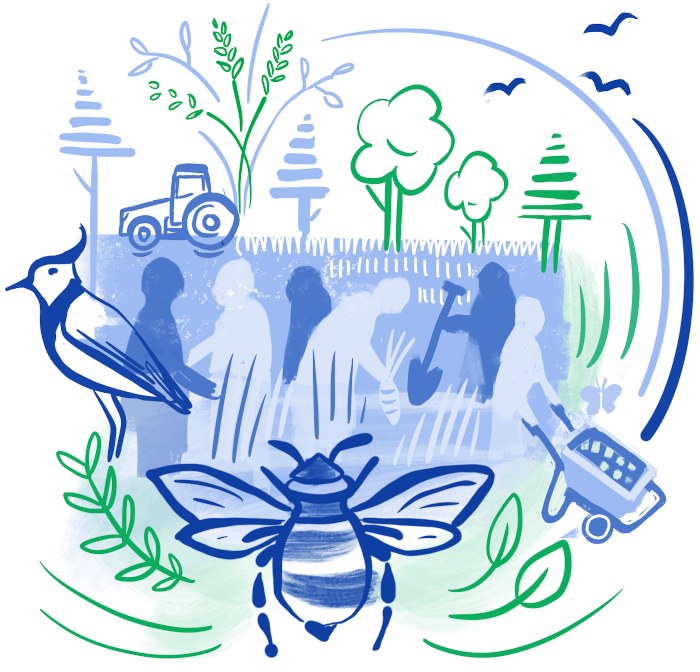Just Agriculture, Alimentation Sovereignty and Forest Use

According to the IPCC Special Report of August 2019, 23% of current human-made → greenhouse gas emissions are attributable to agriculture, forestry and other land use. However, if all elements, e.g. inputs, infrastructure, etc., and all activities, e.g. processing, distribution and transport, etc., of the global food system are included, emissions are as high as 37%. Globally, most of the emissions from the food system are caused by livestock production. In particular, changes in land use, such as deforestation for growing animal feed or for use as pasture land, are driving climate change. The degradation of the soil itself and the production and use of → chemical synthetic fertilizers also emit enormous amounts of → greenhouse gases into the air. The most important part of global methane and nitrous oxide emissions is also attributable to animal husbandry, for example through the spreading of animal excrement or the decomposition products from the digestion of ruminants[1]. The current model of industrial agriculture is also responsible for enormous social inequality and human suffering here and worldwide: expulsion of small farmers* and indigenous people from their land for the cultivation of large → monocultures (landgrabbing), pesticide poisoning, as well as malnutrition and hunger due to the unequal distribution of means of production, such as land and water.
Overcoming Industrial Agriculture
In order to significantly reduce emissions from agriculture and forestry, to make soil and forests the natural greenhouse gas sink (→ sink) again and to strengthen social justice, a radical reorientation of → agricultural policy is needed. But we are confronted with a process of power concentration in the agricultural and food sector. For example, six companies dominate the global production of pesticides and seeds. In addition, international trade agreements, → subsidy systems and genetic engineering legislation are being passed largely without those directly affected having a say.[2]
Food Sovereignty & Agroecology: Our active shaping of the agricultural turnaround
We therefore consider it important to orient ourselves to the political concept of → food sovereignty. By food sovereignty we mean, following the 2007 declaration at the Nyéléni Forum in Mali[3], the right of people to shape their own food and agricultural systems democratically without harming other people or the environment. This requires the establishment of democratic systems and procedures that are free of violence and the influence of corporations and based on equal rights for all and gender equality.
Agroecology, in turn, is a scientifically sound concept based on ecological principles, the approach of food sovereignty and the right to adequate food. This is demanded by social movements such as the international smallholder movement La Via Campesina. Farmers, processors and consumers are the protagonists of a socially just and ecologically sustainable transformation of agricultural and food systems. Together we can fight for a favourable political framework[4].
Central Elements of Agroecology are:
- Biodiverse agriculture: A variety of techniques that contribute to increased biodiversity, humus formation in the soil and a closed nutrient cycle (e.g. crop rotation, legume cultivation) and ultimately also strengthen the self-regulating capacity and resilience of the system. As a result, the soil can become a → sink of → greenhouse gases and producers can become independent of pesticides and nitrogen fertilizers.
- Regionalisation of the food system: the establishment of municipal food councils and solidarity agriculture projects; promotion of non-commercial local distribution structures; state purchase programmes for public institutions
- Deconstruction of industrial livestock farming: immediate halt to construction of animal industry plants; structural change programme for regions previously dominated by animal industry; halt to all manure imports; ban on all animal feed imports; annually decreasing area quotas for animal feed cultivation; focus on legume cultivation
- Nature & climate protection: Reserving former forage areas for climate protection measures, in particular rewetting of former moors; comprehensive expansion of biodiversity corridors; area limitation for energy crop cultivation
- Move the Focus of Education towards Agroecology
- Increase Control over livelihood: control over land, water, biodiversity and knowledge: collective forms of ownership and cultivation must be accepted and protected; preserve and horizontally exchanage local seeds, demand agricultural reforms; squat land
- Strengthen rights of migrant seasonal workers
Political Processes
- Reorientation of the European Commeon Agricultural Policy
- Demand that German politics emhasizes an agricultural turnaround towards ecology in the climate negotiations of the united nations (UN) and in it's international development cooperations. That means, espacially, financially supporting the "Scaling up Agroecology"-Initative of the fooad and agricultural organisation of the united nations (FAO).
- Demand the German Federal Government to sign the UN Smallholder Declaration
- Climate-Smart Agriculture solutions should be seen skeptical, because methods such as the use of genetically modified seeds or precision farming are often equated with agroecology
- Schlatzer, M. (2011): Tierproduktion und Klimawandel, Wien
- Heinrich-Böll-Stiftung, Rosa-Luxemburg-Stiftung, Bund für Umwelt und Naturschutz Deutschland, Oxfam Deutschland, Germanwatch und Le Monde diplomatique : Konzernatlas - Daten und Fakten über die Agrar- und Lebensmittelindustrie (2017, abgerufen am 20.02.2020) https://www.boell.de/de/2017/01/10/konzernatlas?utm_campaign=ds_konzernatlas&dimension1=ds_konzernatlas
- Nyeleni Forum: ERKLÄRUNG VON NYÉLÉNI, Nyéléni, Gemeinde Sélingué, Mali (2007, abgerufen am 2.3.2020) https://nyeleni.org/spip.php?article331
- Brot für die Welt et al.: Positionspapier: Agrarökologie Stärken (2019, abgerufen 22.2.2020) https://www.misereor.de/fileadmin/publikationen/postionspapier-agraroekologie-staerken.pdf
- Deutsche IPCC-Koordinierungsstelle: Sonderbericht über Klimawandel und Landsysteme (SRCCL) - Hauptaussagen der Zusammenfassung für politische Entscheidungsträger SPM (2019, abgerufen am 2.3.2020) https://www.de-ipcc.de/media/content/Hauptaussagen_SRCCL.pdf
- FIAN Deutschland e.V.: Brasilien: Pensionskassen machen Geschäfte mit Ackerland (2019, abgerufen am 2.3.2020) https://www.fian.de/publikationen/shop-mediathek/artikel-details/?tt_products[cat]=10&tt_products[product]=332
- Umweltbundesamt: Umwelt und Landwirtschaft (2018, abgerufen am 20.02.2020) https://www.umweltbundesamt.de/sites/default/files/medien/376/publikationen/uba_dzu2018_umwelt_und_landwirtschaft_web_bf_v7.pdf
- Pat Mooney, ETC Group: Blocking the chain. Industrial food chain concentration, Big Data platforms and food sovereignty solutions (2018, abgerufen am 2.3.2020) http://www.etcgroup.org/content/blocking-chain
- Steinfeld, Gerber, Wassenaar, Castel, Rosales, Haande (2006): Livestock's Long Shadow: Environmental Issues and Options, Rom: Food and Agriculture Organization of the United Nations (FAO), S. 112
- La Via Campesina (2018): La Via Campesina in Action for Climate Justice. Heinrich Böll Stiftung. abgerufen am 2.3.2020